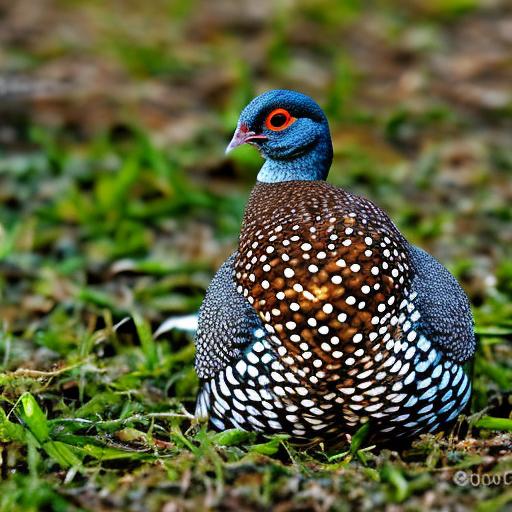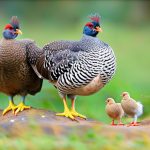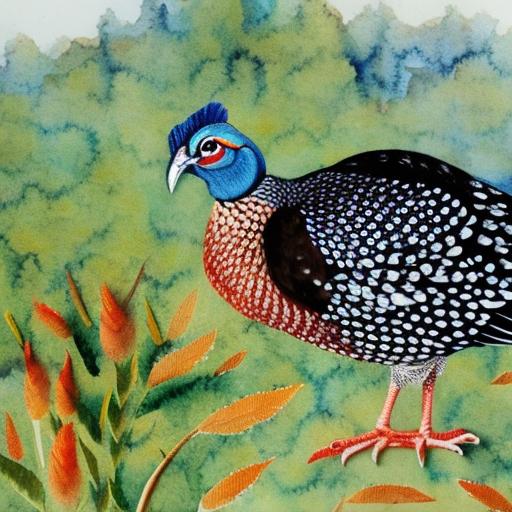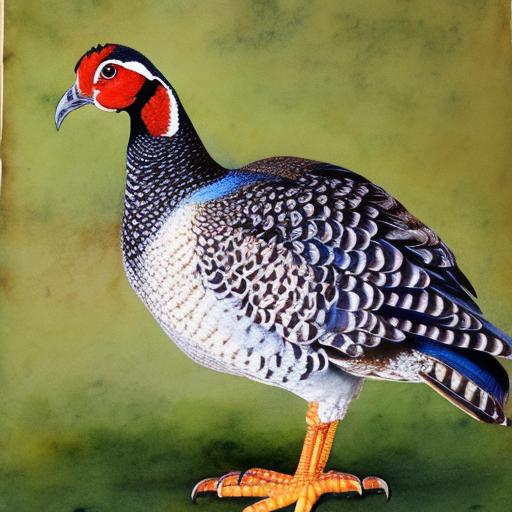Have you been peering into your coop, wondering why the little speckled treasures from your guinea hens are nowhere to be found? If so, rest assured that you’re in good company. Many folks who raise these delightful birds find themselves scratching their heads as they gaze at empty nest boxes.
No need for concern! After taking a closer look at the life cycle of guinea fowl, it becomes clear that these fine-feathered friends march to the beat of their own drum when it comes to egg-laying.
Take this nugget of knowledge: typically, a guinea hen won’t start her egg-laying routine until the spring after she’s born. Equipped with tips from seasoned breeders and backed by scientific research, I’ve put together this guide to shed light on our helmeted pals’ nesting habits.
We’ll dive into not only understanding when they lay but how we can encourage a flourishing season.
Get ready for an eye-opening journey as we explore what makes your flock tick!
Understanding Guinea Hens
Guinea fowl are unique birds known for their pest control abilities and watchful nature. People keep Guineas as a natural way to control insects, protect gardens, and even warn of approaching predators.
Raising Guinea hens can also provide a sustainable source of eggs and meat for the homestead.
What are Guinea Fowl?
Guinea fowl are unique birds with a round body and a small head. Their feathers have spots, which helps them blend into the grass and bushes. People keep guinea fowl for many reasons.
Some like their loud call because it warns when something strange is around. Others enjoy their eggs or use them to control bugs.
These birds come from Africa but live on farms all over now. Guinea hens lay tasty eggs that you can eat just like chicken eggs. They make good pets too because they help in the garden by eating insects and weeds.
Why do people keep Guineas?
People keep Guineas for pest control and as a natural alarm system. These birds eat bugs like ticks, flies, and grasshoppers, helping to keep the insect population down around your property.
Their loud calls serve as an effective warning when predators are near, making them excellent watchdogs.
They are also raised for their flavorful meat and unique eggs. Guinea fowl meat is leaner than chicken and rich in nutrients. The spotted eggs they lay have a strong taste perfect for baking or cooking into nutritious meals.
Benefits of raising Guinea hens
Raising Guinea Hens has a range of benefits for guinea fowl keepers. Here’s why keeping them is advantageous:
- They are excellent at pest control, consuming insects and ticks.
- Their loud calls act as an effective warning system against predators, providing security for other poultry.
- Guinea hens require minimal care and maintenance, thriving in free-range environments.
- The meat of Guinea fowl is considered a delicacy, leaner and richer in flavor than chicken.
- They have a unique appearance and add aesthetic value to a farm or homestead.
- Their eggs are smaller but have a richer taste compared to chicken eggs.
Egg-Laying Patterns of Guinea Hens
Guinea hens typically start laying eggs at around 24 weeks old and can lay up to 100 eggs per year. They may continue to lay eggs for several years, with production slowing down as they age.
When do Guinea hens start laying eggs?
Around 14-15 weeks old, Guinea hens can begin laying eggs, typically starting in spring. Usually, they lay from April or May through to September/October. The frequency of egg-laying varies throughout this season.
The start of egg-laying is more likely between 30 and 34 weeks old but rarely at 24 weeks. Hens may begin laying between 12 and 20 weeks, differing from chickens. On average, a hen lays about two eggs in a clutch during their laying season which lasts from spring into the fall.
How often do Guinea hens lay eggs?
Guinea hens lay eggs daily during their peak laying season, which typically spans from March/April to September/October. On average, they produce around 100 eggs in a season. Generally, Guinea fowl start laying at 30-34 weeks old and can begin as early as 14-15 weeks old.
However, it’s less common for them to start at the younger age. They lay approximately two eggs in a clutch and have varied nesting habits compared to chickens.
The frequency of egg-laying by Guinea fowl is remarkable – they don’t stop at weekends! During their prolific laying season, they can be counted on to produce eggs daily. While there isn’t an exact number of eggs laid per year specified, it’s noted that they are capable of consistent daily production throughout their active laying phase.
How long do Guinea hens continue to lay eggs?
Guinea hens typically lay eggs from late spring through early autumn. They may continue to lay for about 3 to 4 years, with the strongest egg production occurring during the first two years.
As they age, their egg-laying frequency gradually declines until it eventually stops altogether.
It’s important to note that individual Guinea hens may exhibit variations in their laying patterns and duration of egg production based on factors such as health, nutrition, and environmental conditions.
Caring for Guinea Hens During Egg-Laying
My experience with incubating Guinea Fowl eggs, raising keets, and ensuring proper feeding and housing for the hens has been both challenging and rewarding. Find out more about how to care for your Guinea Hens during egg-laying by reading the full article!
Incubating Guinea Fowl eggs
To incubate Guinea Fowl eggs, you should first gather the eggs from the nesting area. Place the eggs in an incubator set at a temperature of 99.5 degrees Fahrenheit and 60% humidity. Turn the eggs three times daily for the first 24 days to ensure proper development. Stop turning the eggs on day 25 to prepare for hatching. Keep the incubator closed during the hatching process to maintain consistent temperature and humidity levels. After hatching, transfer the keets to a warm brooding area with access to food and water. Monitor their health closely during their first few weeks of life.
Raising Guinea Fowl keets
Raising Guinea Fowl keets is a crucial part of nurturing your flock. Here’s how to do it right:
- Provide a warm brooder, ensuring the temperature is around 95°F for the first week and then reduced by 5°F each week.
- Use a high – protein game bird starter feed specifically formulated for young guinea fowl to support their growth and health.
- Keep the brooder clean and dry to prevent disease and maintain hygienic conditions for the keets.
- Offer fresh water daily, making sure it’s easily accessible and shallow enough for the keets to drink without drowning.
- Introduce suitable bedding materials such as pine shavings or chopped straw to keep them comfortable and warm.
- Monitor their behavior closely, paying attention to any signs of distress, illness, or bullying among the keets.
- Allow ample space for them to move around as they grow, ensuring they can exercise and develop properly.
Feeding and housing Guinea Hens
When it comes to feeding and housing Guinea Hens, it’s important to ensure they have access to a balanced diet and secure shelter. Here are some key points to consider:
- Provide a diet that includes poultry feed supplemented with fresh greens, insects, and grit for digestion.
- Ensure access to clean water at all times, especially during hot weather when Guinea fowl require more hydration.
- Secure housing with protection from predators such as raccoons and foxes, as Guinea Hens prefer to roost in trees at night.
- Create an adequately sized coop or shelter with proper ventilation and nesting boxes for egg-laying.
Factors Affecting Guinea Hen Egg Laying
The egg-laying patterns of Guinea Hens can be influenced by various factors including weather conditions, nutrition, physical health, and environmental stressors. Understanding these factors can help you optimize your Guinea hen’s egg production.
Impact of weather on egg-laying
Weather greatly affects Guinea fowl egg-laying. During hot weather, the hens lay more eggs compared to cold or wet conditions. Extreme temperatures can disrupt their laying patterns and affect fertility.
In warmer climates, they might start laying earlier and continue longer than in colder regions, due to extended daylight hours affecting their hormone regulation.
Rainy weather can discourage Guinea hens from nesting, sometimes leading them not to lay any eggs at all for a while. Additionally, excessive rainfall may lead to the destruction of nests and even impact the survival rate of their chicks once hatched due to hypothermia if not properly sheltered.
Role of nutrition and physical health of Guinea hens
Proper nutrition and good physical health are crucial for Guinea hens. Providing a balanced diet rich in protein, vitamins, and minerals supports their reproductive health and egg production.
Also, maintaining a clean environment helps prevent diseases that could affect their laying patterns, ensuring they can lay quality eggs throughout the season. Monitoring their weight and behavior allows early detection of any health issues that may impact their ability to lay eggs regularly.
Guinea hens benefit from being allowed to free-range as it provides them with access to diverse insects and plants which supplement their dietary needs. Regular checks for signs of parasites or malnutrition are essential to maintain optimal health and productivity for our guinea fowl flock.
Frequently Asked Questions about Guinea Hen Eggs
– Yes, you can eat Guinea Fowl eggs! They are actually prized for their rich and flavorful taste.
– Guinea Hens do go broody, and they can be great mothers to their keets.
– Guinea Fowl can lay eggs throughout the year, but their egg production tends to decrease in the winter months.
Can you eat Guinea Fowl eggs?
Guinea fowl eggs are entirely safe and tasty for consumption. They have a rich flavor, similar to chicken eggs but with a slightly stronger taste. The nutritional value of guinea fowl eggs is high, providing essential nutrients like protein, vitamins, and minerals.
Moreover, their unique flavor makes them an excellent addition to various culinary dishes.
It’s important to note that the size of guinea fowl eggs can vary; they are typically smaller than chicken eggs but equally delicious. Due to their robust taste and nutritional benefits, guinea fowl eggs are sought after by many food enthusiasts and chefs alike for their distinct qualities in cooking and baking recipes.
Do Guinea Hens go broody?
Guinea hens broody late spring or early summerBroodiness may be triggered by an increase in daylight hours or warmer temperatures.
Broody Guinea hens will sit on their eggs for about 28 days until they hatch. Once the keets arrive, these vigilant mothers will fiercely protect and care for their young. It’s important to provide a safe and quiet place for the hen to nest if you want her to successfully hatch her eggs.
Can Guinea Fowl lay eggs all year round?
Guinea fowl do not lay eggs all year round but start in the spring, continuing through summer into fall. They usually begin laying at about 30 to 34 weeks of age and can produce around 100 eggs per season.
Unlike chickens, Guinea fowl have different egg-laying patterns and will not lay during winter months.
During their laying season, which typically spans from March/April to September/October, Guinea hens can lay up to two eggs in a clutch. Their fertile egg duration is unspecified, and they display unique nesting habits compared to chickens.
How to determine the sex of Guinea fowl?
To determine the sex of Guinea fowl, observe their feather patterns. The adult males, known as “keets” have larger and distinct crests, along with plain or solid-colored feathers. In contrast, adult females typically display smaller crests and more prominent polka-dot markings on their feathers.
Observing the vocalization behavior is also crucial in identifying Guinea fowl gender. Adult males produce a two-syllable call which sounds like “buck-wheat,” while females emit a one-syllable sound that resembles a “buck.” Additionally, examining the size of the helmet located on top of their heads can further assist in distinguishing between male and female Guinea fowl.
Conclusion
In conclusion, Guinea hens start laying eggs in spring and continue through summer into fall. Their practical egg-laying patterns are efficient for farmers. Are you ready to welcome these prolific layers into your flock? Explore additional resources on raising Guinea hens for a thriving experience.
Embrace the impact of their consistent egg production and take action today!
FAQs
1. What time of year do guinea fowl lay eggs?
Guinea fowl egg laying season happens mainly during the warmer months, when they start their reproductive cycle and lay more frequently.
2. How often do guinea hens lay eggs?
During the egg laying season, a healthy guinea hen can lay an egg nearly every day, leading to a good amount of guinea fowl egg production.
3. At what age do guinea fowls start to lay eggs?
Guinea fowls begin laying eggs at about 6 to 8 months old; this is when they reach the right age for starting their egg-laying behavior.
4. Do male guinea fowls help with egg laying?
Male involvement in guinea fowl breeding includes mating but doesn’t directly involve the actual process of laying or brooding eggs; that’s mostly done by females.
5. How long does it take for a guinea hen’s eggs to hatch?
After all the nesting habits and brooding behavior are done, it takes about 26-28 days for incubation before you see baby chicks from the hatching process.
6. Should I be taking care of Guinea Fowl nests regularly?
Yes! Regularly check on your birds’ nests since good nest management ensures higher fertility and successful fertilization of Guinea Fowl Eggs.
Meet Walter, the feathered-friend fanatic of Florida! Nestled in the sunshine state, Walter struts through life with his feathered companions, clucking his way to happiness. With a coop that’s fancier than a five-star hotel, he’s the Don Juan of the chicken world. When he’s not teaching his hens to do the cha-cha, you’ll find him in a heated debate with his prized rooster, Sir Clucks-a-Lot. Walter’s poultry passion is no yolk; he’s the sunny-side-up guy you never knew you needed in your flock of friends!







